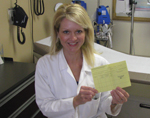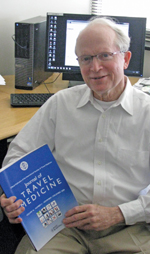|
by Dawn
Brazell
Public Relations
If you happen
to grab lunch with Joseph Cantey,
M.D., or physician assistant
Cameron Oswald, be sure to steer
clear of certain subjects.
The infectious
disease and travel medicine
experts are loaded with
information on how best to prepare
for international travel,
particularly to Third-World
countries, so that you're best
protected. But, they also have the
rare horror story.
Take the
botfly, for example.
Fortunately,
it's very rare, but travelers in
certain tropical regions sometimes
become this insect's victim. An
egg-laden female botfly will
capture a mosquito and glue her
eggs onto the mosquito in hopes
that the eggs will find their way
to a human host. When the mosquito
bites a victim, the host's body
heat triggers an egg to hatch,
fall off and burrow in.
The larva
secures itself and grows, forming
a small mound beneath a person's
skin.
 Oswald said it's
particularly unpleasant when the
mounds start to move around.
Fortunately, there's a relatively
simple cure of suffocating it and
providing antibiotic treatment.
Oswald has seen only one case in
his clinic. Oswald said it's
particularly unpleasant when the
mounds start to move around.
Fortunately, there's a relatively
simple cure of suffocating it and
providing antibiotic treatment.
Oswald has seen only one case in
his clinic.
Cameron Oswald, physician assistant, holds up the yellow vaccination card, approved by the World Health Organization, that she makes sure travelers keep up to date.
While treating
illnesses acquired traveling is
part of the job, a larger portion
of the work of MUSC's Travel
Medicine clinic is dedicated to
prevention. Given the growth in
the field of travel medicine, it
keeps health experts busy.
International tourist arrivals
grew by more than 4 percent in
2011 to hit the 980 million mark,
according to the United Nations
World Tourism Organization. With
growth expected to continue in
2012, international tourist
arrivals are on track to reach the
milestone one billion mark later
this year.
Cantey
encourages travelers going to
exotic locales to get appointments
a couple of months before their
trips. MUSC travel medicine
experts check immunizations and
consult TRAVAX, an interactive
website to which the department
subscribes that provides the
latest travel health information
for health care professionals.
There is an entry on TRAVAX for
every country in the world,
including details on general
health risks, outbreak news,
immunization recommendations,
malaria prevention and other
infection risks and the best
places to go for medical services
at the destination.
 "We know what's going
on to the very last minute," said
Cantey. "We've been trained in all
these diseases and infectious
diseases." "We know what's going
on to the very last minute," said
Cantey. "We've been trained in all
these diseases and infectious
diseases."
Dr. Joseph Cantey
Although there
are more travel medicine
vaccination centers opening,
Cantey said it's important that
patients seek out a center staffed
by physicians with access to a
subscription service such as
TRAVAX. "It's far more complicated
than just giving vaccines."
MUSC travel
medicine experts examine patients
and assess their current health
status before making vaccination
and other health recommendations.
They also give patients packets of
information based on the regions
to which they are traveling as
well as general educational tips,
such as remembering not to rinse
toothbrushes with tap water for
those traveling to places with
unsafe water.
Oswald said
travelers will be careful not to
drink the water, but then eat
something that's been washed in it
or rinse their toothbrushes just
out of habit. They also may not
know that dairy products such as
cheese, yogurt, ice cream and milk
may be unpasteurized in some
areas. She does what she can to
raise awareness so they can
minimize their risks.
"People travel
all the time without vaccines and
malaria pills," she said. "They're
taking a big risk. We want to make
people more aware and minimize
that risk."
Sometimes the
tips are as simple as clothing
choice. Cantey said tsetse flies
prefer blue clothing, so they
advise patients going to areas
known to be a problem for that,
such as Kenya, to wear
light-colored clothing since
insect repellants don't work.
Tsetse flies cause African
trypanosomiasis or sleeping
sickness. It is a tropical disease
caused by a parasite that is
transmitted to humans by an
infected tsetse fly and can be
fatal if not treated.
One of the most
common problems is malaria, which
they've seen in cases of returning
travelers. This disease is caused
by a parasitic microbe spread by
mosquitoes. Each year, malaria
infects at least 300 million
people living in tropical regions.
It can cause brain damage or death
if red blood cells infected with
malaria parasites build up in the
brain's blood vessels.
Also, parasitic
worm diseases can be picked up by
wading in certain waters, so they
warn travelers what waters are
known to be contaminated.
Travel can be a
wonderful, fun adventure,
especially if travelers get
educated about the tricks of the
travel medicine trade to protect
their health. Oswald said she
enjoys being a travel medicine
specialist because generally
patients are happy and excited to
be going on fun trips.
"I live
vicariously," she said smiling.
Cantey agreed. Their goal for
happy travelers: To keep them that
way.
For more
information, visit The Travel
Clinic, at www.muschealth.com/travelclinic/.
|



 Oswald said it's
particularly unpleasant when the
mounds start to move around.
Fortunately, there's a relatively
simple cure of suffocating it and
providing antibiotic treatment.
Oswald has seen only one case in
his clinic.
Oswald said it's
particularly unpleasant when the
mounds start to move around.
Fortunately, there's a relatively
simple cure of suffocating it and
providing antibiotic treatment.
Oswald has seen only one case in
his clinic. "We know what's going
on to the very last minute," said
Cantey. "We've been trained in all
these diseases and infectious
diseases."
"We know what's going
on to the very last minute," said
Cantey. "We've been trained in all
these diseases and infectious
diseases."